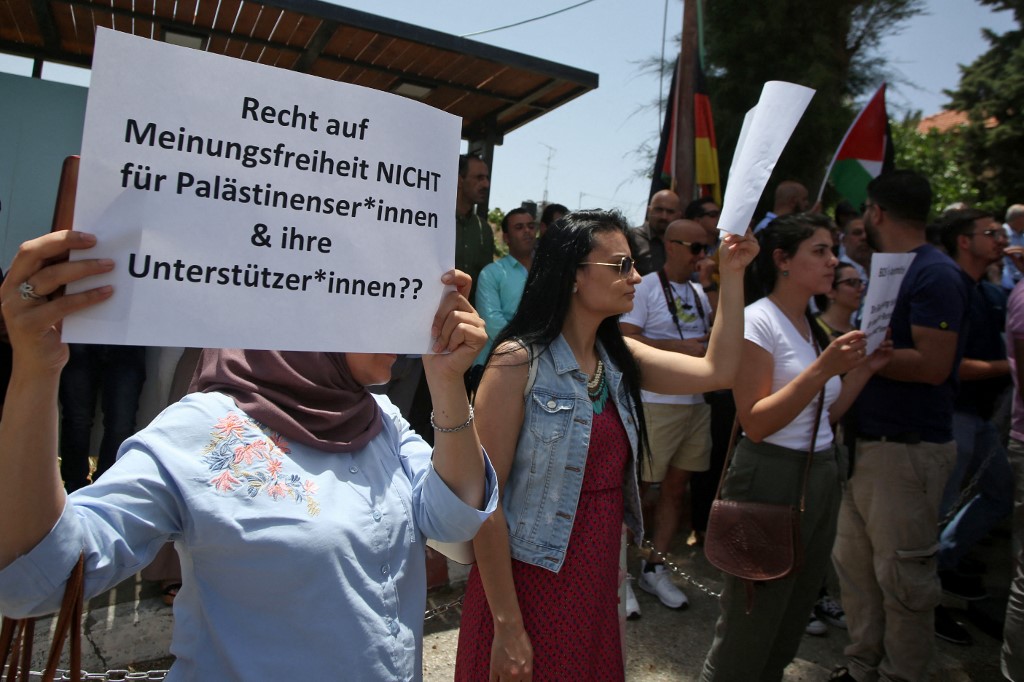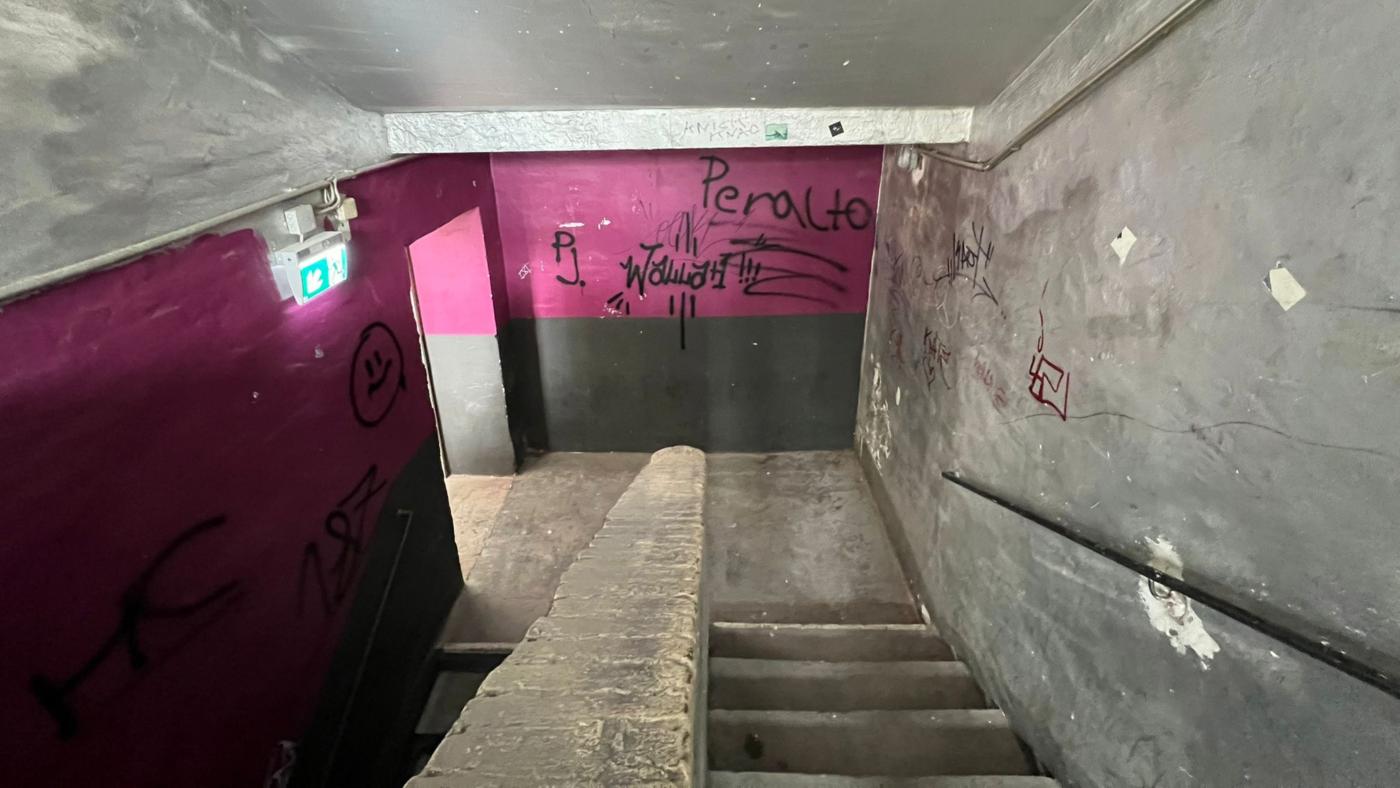Germany: Goethe Institute accused of censoring Palestinian voices

When Germany’s Goethe Institute in Hamburg first approached Moshtari Hilal to participate in a conference examining how right-wing groups manipulate social media, the Afghan-German artist warily agreed.
Hilal was asked by Goethe, a state-funded art institute, to work with her friend and Berlin-based artist and creative Sinthujan Varatharajah to create something for Goethe’s event.
Earlier this year, both had made a buzz on social media after they hosted a discussion on how major art collectors in Germany inherited their wealth from Nazis.
Brainstorming over WhatsApp messages and coffee, both decided a round-table with guests from across the world would be the best way to contribute to Goethe’s conference, Beyond the Lone Wolf Offender - Dynamics of the Global Right.
They drew up a shortlist of possible guests, including prominent Palestinian poet and activist Mohammed El-Kurd, and sent the names to Goethe.
Stay informed with MEE's newsletters
Sign up to get the latest alerts, insights and analysis, starting with Turkey Unpacked
El-Kurd became prominent in 2020 when he began posting about Israeli attempts to seize his family home in Sheikh Jarrah. His posts garnered thousands of shares and nearly a million followers on various platforms.
“The intention was to invite El-Kurd for his expertise and experience with strategies from the right, targeting him and his work online and through media campaigns,” Hilal told Middle East Eye.
'It just wasn’t an option for us to participate in a conference on right-wing dynamics and disinvite a Palestinian voice in the process'
– Moshtari Hilal, Afghan-German artist
“We intentionally didn’t put the focus on Israel, but on a comparative round-table beyond national frameworks, as these attacks and campaigns also happen across different platforms.”
Initially, Goethe took the list and exchanged emails to help turn Hilal and Varatharajah's vision into reality.
Goethe’s staff approved the list, prompting Hilal and Varatharajah to send out invitations to their prospective speakers.
El-Kurd confirmed his appearance at the festival, and Goethe discussed logistics, including how to get the speakers to Germany and details on securing a visa for the Palestinian poet.
"We were surprised it got that far, and at one point felt reluctantly optimistic that we could get Mohammed to Germany," said Hilal, from her base in Hamburg.
Varatharajah echoed Hilal's surprise that they were able to invite Kurd.
The Palestinian activist was close to speaking in Germany for the first time. But after weeks of emails, both artists received a phone call and an email from the Goethe Institute in Hamburg, informing them that its head office in Munich had decided to officially “disinvite” Kurd to the festival.
Kurd had become the latest victim of censorship for Palestinians in German society - particularly in the arts scene.
In 2019, Germany's Bundestag took a symbolic vote to declare the Palestinian-led Boycott, Divestment and Sanctions movement antisemitic.
The BDS movement calls for economic pressure on Israel to end the occupation of Palestinian land, grant Palestinian citizens equal rights and recognise the right of return of Palestinian refugees.
Several German institutions, including Goethe, signed an open letter condemning the 2019 Bundestag resolution against BDS as "dangerous" and "misused to push aside important voices".
But the non-binding resolution sent shockwaves through German civil society, creating a chilling climate that has led many civil society groups that receive funding from the German state to stop engaging with groups suspected of supporting the BDS movement.
"We were informed that we have to disinvite him," said Hilal. "Goethe Institute told us he can't be part of the round-table and that his initial invitation by the event organisers was an error.
“Goethe then suggested we invite someone else in Mohammed’s place, but we sent an email stating that just wasn’t an option for us to participate in a conference on right-wing dynamics and disinvite a Palestinian voice in the process. The suggestion they had was a white-German academic, which just didn’t make sense.”
Days after Goethe's decision to rescind its invitation to El-Kurd went public, the Indonesian artist collective Ruangrupa, headlining this year's prestigious Documenta art festival in Berlin, faced accusations of antisemitism for a mural it had produced. Local politicians and activists also criticised Ruangrupa for including the Palestinian arts collective the Question of Funding in their curation, because it allegedly supported a boycott of Israel.
Ruangrupa denied the claims of antisemitism and, in early July, told Germany's Bundestag during a special hearing that it did not support the Boycott, Divestment and Sanctions movement.
Sabine Schormann, the head of Documenta, was also forced to resign over her handling of the antisemitism claims against Ruangrupa.
In late May, a space housing the Question of Funding's artwork for Documenta was vandalised, with the interior spraypainted with the last name of Isabel Peralta, a Spanish far-right activist.
In March, according to a report in Germany's Der Spiegel newspaper, Peralta was stopped while trying to enter Germany through Frankfurt airport with neo-Nazi propaganda, including a swastika flag.
Giovanni Fassina, director of the European Legal Support Centre, an NGO that helps Palestinian civil society fight censorship and attacks on Palestine activism across Europe, described the climate in Germany as "particularly harsh”.
"The fear of speaking out is prominent in the media, academia, the cultural and arts scene and even among activists," Fassina told Middle East Eye.
"This chilling effect is the result of restrictive policies such as anti-BDS resolutions and the institutional use of biased definitions of antisemitism, like the IHRA definition, as well as the anti-Palestinian sentiment.
"Those lead to severe restrictions on fundamental rights: people lost their job, could not freely protest or assemble, were censored or disinvited from public events. Some even were surveilled or feared for their life. The recent attack against Palestinian artists participating in Documenta 15 is illustrative of that extreme climate."
But the fear of a potential backlash did not stop Hilal and Varatharajah from speaking out. Both artists protested the decision by sending Goethe a statement, giving the institute several weeks' notice of their intention to go public that El-Kurd had been disinvited.
"Moshtari and I had sent Goethe our statement three weeks before the festival was due to take place, to give them time to respond,” said Varatharajah.
“But since Goethe didn't release their festival programme, it made no sense for us to push our statement out without it. So we waited until then before going public. By this time, Goethe had enough time to prepare a statement, but they didn't have one, and that speaks volumes."
When the artists went public with Goethe's decision, thousands of people retweeted their statement. British-Pakistani author Mohammad Hanif pulled out of the conference in solidarity with El-Kurd, followed by African-American writer Ijeoma Oluo. In a statement, Oluo said: "There is no discussion on global white supremacy and right-wing violence without the inclusion of Palestinian voices."
Berlin-based writer Hanno Hauenstein also cancelled his participation in the festival, stating that Germany is "probably the only context I can think of where in (supposedly) progressive circles, you have to keep explaining that anti-racism that doesn't care about Palestinians is a bad joke”.
Goethe was forced to scale down its conference, eventually cancelling the event which had been due to take place in the last week of June.
"The round-table never went ahead, but we showed German society something way more important: that a line can and must be drawn on anti-Palestinian racism here," said Varatharajah.
"The impact of what we did is much bigger than we anticipated. Its repercussions are still felt on different ends of this world, and that's very powerful."
Jessica Magri, a spokesperson for the Goethe Institute, "rejected the allegation of anti-Palestinian racism".
She told MEE that El-Kurd was not an "appropriate speaker" for the conference because of his previous criticisms of Israel. Citing an administrative error for El-Kurd's initial invitation, Magri said the "necessary internal coordination only took place after a premature commitment had already been made”.
Magri said: "After some consideration, the Goethe Institute decided that Mohammed El-Kurd was not an appropriate speaker for this forum: in previous posts on social media, he had made several comments about Israel in a way the Goethe Institute does not find acceptable - especially since the forum wanted to discuss, among others, possibilities and ways to improve social discourse.”
When asked which posts, in particular, led Goethe to rescind its invitation for El-Kurd, Magri said it was based on an “overall assessment of his statements".
“The tweets and posts we are referring to can be found primarily on social media networks and contradict our understanding of civil society discourse in content and phrasing,” said Magri. “We support an inclusive dialogue characterised by a diversity of opinion and a non-violent language."
MEE asked El-Kurd for comment but had not received a response at the time of publication.
"I'm pretty sure that [Goethe] didn't review the tweets of any other guests, but that's what they do with Palestinian voices," said Hilal.
Varatharajah disputed the claim that Goethe's decision to disinvite El-Kurd boiled down to an administrative error.
"It's very common for German institutions like Goethe to hide their racism and contempt for Palestinian voices behind so-called administrative errors,” said Varatharajah.
“What they are saying is that we shouldn't have allowed for El-Kurd to be invited in the first place by Goethe Institute. They are not saying they are sorry that they disinvited El-Kurd. That's important to keep in mind."
For now, Hilal and Varatharajah remain hopeful that their decision to go public will encourage others to draw attention to the situation facing Palestinian artists in the German art scene. But both artists have already been reminded of the possible repercussions of their actions.
“Some people have already warned us about the effects these kinds of statements can have on our careers, like never getting invited or funded by the Goethe Institute,” said Hilal. "But only time will tell."
Middle East Eye delivers independent and unrivalled coverage and analysis of the Middle East, North Africa and beyond. To learn more about republishing this content and the associated fees, please fill out this form. More about MEE can be found here.






